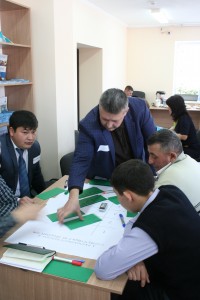Giuseppe Feola spent three weeks in February and March 2016 doing fieldwork in south-east Kazakhstan. He was accompanied by postdoctoral researcher Tristam Barrett and worked in close cooperation with colleagues at the Institute of Geography in Almaty. The team also benefitted from the support of the Local Community Fund, an NGO which runs an agribusiness centre in Shelek, near one of the research sites. The research team set out to collet data for the project “Climate change, water resources and food security in Kazakhstan“.
The first phase of the field work involved organising and conducting two multi-stakeholder workshops in the villages of Koram and Karaoi. Both villages have experienced serious water management issues in recent years, and the workshops allowed the research team and the participants to identify the major challenges faced by the water management system in the each location. The workshops enabled productive discussions across the boundaries that traditionally separate farmers, local authorities, NGOs and local scientists, and therefore helped unravel the complex relations between the challenges faced by different actors in dealing with water use in agriculture. For example, the workshops clearly showed that, while climate change affects water availability in this region, infrastructural inadequacies and financial and organisational issues play an important role in limiting the adaptive capacity of the farming system to climate change.
The second phase of the field work involved field visits and semi-structured interviews with 21 participants . With the aid of a mental mapping technique, the interviews allowed us to grasp the interviewee’s understanding of the water management system, in its infrastructural, environmental, and institutional dimensions. Moreover, the interviews also focussed on ongoing adaptation strategies. These include, for example, spontaneous rescheduling of water supply rotations among farmers and farmer self-organisation to clean some of the main irrigation canals and fill the gap let by the inability of the responsible state organisation to maintain the irrigation infrastructure.
This research will improve understanding of agricultural adaptation to climate change in south-east Kazakhstan, but it also sheds light on the still ongoing post-Soviet transformation of agriculture in this country.
You can read more about Giuseppe at his staff profile and personal webpage.



